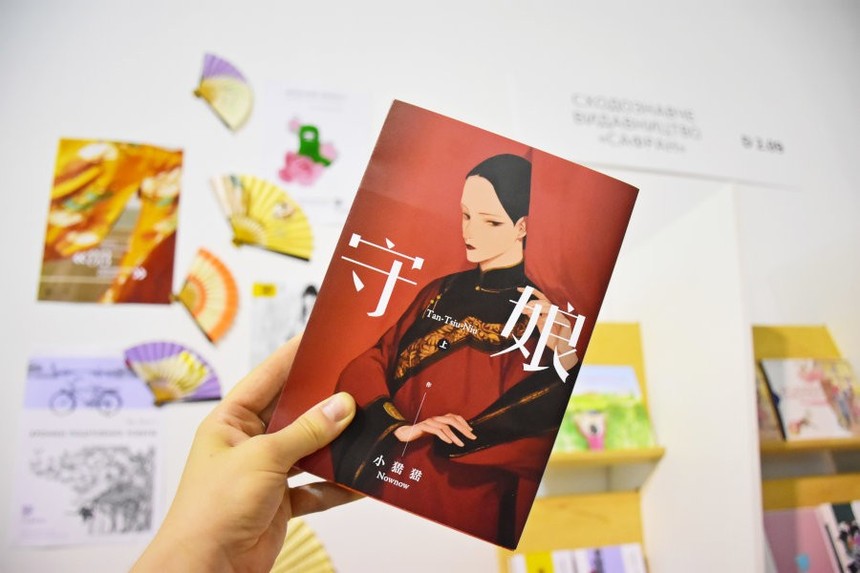
Asian literature is a world of its own. It shows the life, culture, and traditions of the territories that remain largely uncharted for Ukrainians. It also offers a way to explore new lands, possibilities, and approaches and create new senses. Asian books would be fascinating and useful not just for people who love cuddling up with a book in a comfortable armchair but also to entrepreneurs doing business with Chinese partners, students going to China, or travelers on their way to Asia. Yet, a question pops up. Where can they get these books?
We talked to Svitlana Pryzynchuk, founder of Safran publishing, about her experience of foregrounding Asian literature in Ukraine.
Asian books on Ukrainian bookshelves is a brand-new phenomenon. You should just try walking around bookstores in Ukraine, searching for books about Chinese culture. You will hardly find anything, even in the capital. Or you can go to Petrivka, a book market in Kyiv, and find the Russian-language books dating back to the 1980s at best. That would be it for your quest to learn about Asian culture. I lived in China for a long time, and after coming back, I realized that I had never read a single Chinese book in Ukrainian translation. That’s why in 2016, I got this idea to set up an oriental publishing house, the first of its kind in Ukraine.
The years 2014 and 2015 marked the publishing boom in Ukraine. The import of Russian books was banned, and the national book market started to rise. I used to think about making a magazine focused on Asian culture. But when the Ukrainian publishing industry began to flourish, the idea of a magazine transformed into the concept of a publishing house. The formal launch happened much later. It was necessary to set the stage, so I spent a few years looking for experts in Asian studies, linguists, and other professionals to work on our projects. In our industry, it’s all about professionals. There aren’t many of them in Ukraine, and quite a few live abroad. In 2018, Safran publishing house was registered officially, and in 2019, we participated in the International Book Arsenal Festival, having published only two books by that time.
Now we have several book series. Contemporary literature, a classical series that includes poetry, philosophy, and «The Classic of Tea», children’s books, and a non-fiction series. Each book comes with its own story and is well worth the effort we have to invest to publish it in the emerging Ukrainian book market.
It was very hard at first. The readers were careful about this brand-new literature, sizing it up. Over the past three years, we’ve been relentlessly promoting our books on social media and partnering with all kinds of initiatives. We’ve been writing articles and reviews and doing events. With our first two books, we did more than fifteen presentations in big cities across Ukraine. It took us lots of effort to draw the readers’ attention to the Asian literature and persuade them that it’s fascinating and introduces the culture with the centuries-long history. But the interest in Asian literature has been growing steadily. We have many loyal readers looking forward to new books. Some of them collected all our books in their home libraries.
New literature, new history, new culture—it’s the easiest way for readers to expand their knowledge and move on to the next level of intellectual and spiritual growth. And you never know when a quote from a Chinese philosopher can change the course of your life. Things like this do happen. Introduction to a new culture is always a fascinating and useful experience. I wanted to make my project just like this—fascinating and useful. We have been quite successful so far, growing up, establishing contacts in Ukraine and China, and introducing Ukrainians to the unfamiliar culture. Our reader community is expanding with each new book.
We consider the interests of Ukrainian readers and curate our portfolio to make it genuinely interesting and valuable. For example, our publishing house cooperates with Dolphin Books, part of China International Publication Group, a large media corporation. We are planning to publish two children’s books about Chinese theater in partnership with them. Last year, we published «The Legends of China», a book series, and «24 Solar Terms». Our partners share their recommendations with us but let us make the final decision. We publish whatever books we like. Some of the recommended books catch our eye, and others do not.
The Chinese market is enormous and quite specific. It generates billions of dollars of revenue. Chinese presses publish lots of educational books, translations, and Western literature. But it’s not just any translations that can be published in China. There’s a government control in place. No one can guarantee that you will be issued an ISBN for your book. And you cannot publish a book without it. There are hardly any private publishing houses in China. Almost all of them are state-owned and follow the government policy. Private publishers account for 3% of the market at best. It all makes their book industry quite different from ours.
It is even harder than publishing Chinese books in Ukraine. Time will tell. We are cooperating with Chinese publishing houses. And as our press is the only one in Ukraine publishing Asian literature, everyone knows us, and many different roads take people to our publishing house. Our friends living in China refer the Chinese presses to us, and this way, a pool of contacts is being built, promoting cultural exchange between Ukraine and China.
By Nelia Madiyevska